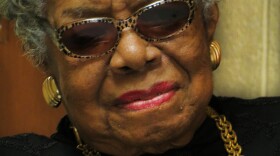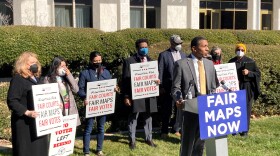Maya Angelou lived in a rambling yellow house just down the road from Wake Forest’s campus. A few hours after she passed away inside, people drove by slowly. Some pointed out the window. Everyone was keeping a respectable distance.
Angelou was renowned for many things, including hosting large parties in the house. Most Aprils, Angelou even held a class here.
“I remember when the registration opened up,” says Matt Williams, Wake Forest Class of 2009. “It was a 9:00 call and I remember sprinting from the opposite end of campus to Tribble Hall so I can physically write my name down on this yellow Steno pad to register for the course. Knowing I was admitted was probably the best feeling ever.”
The class Angelou taught did not disappoint. It was called World Dramatic Poetry, and she demanded that students memorize poems and recite them with all the passion she brought to her own work.
“I remember this one woman in the course when she was reciting Phenomenal Woman, which is one of Dr. Angelou’s most famous works,” recalls Williams. “It requires a lot of bravado and sassiness and she had a very small delivery and voice and Dr. Angelou says to her ‘Speak up. Be bold!’ And she said that when you speak small like this, it lets a brute know there’s a victim in the neighborhood.”
No wonder that young woman in her class felt some pressure. Angelou didn’t just read poetry, she embodied it and brought it to life, using all of her considerable talents, not the least of which was a unique, singular voice.
Angelou came to Wake Forest in 1982 when she was in her late 50s and already very well known. Her bestselling memoir, I Know Why The Caged Bird Sings, had been published twelve years earlier.
Wake Forest earned instant credibility in hiring her. And over the years, whatever they paid her proved to be a bargain.
“I think what she brought to our university was her own immeasurable talents and openness,” says Mary DeShazer, a professor of English at Wake Forest. “She was willing to speak at so many events at Wake Forest. She often spoke at first-year orientations to first-year student who came because she was here.”
In one of her final public appearances, Angelou spoke to students as part of an event called The Dignity and Respect campaign. In the speech last October, Angelou was in a wheelchair and spoke for only ten minutes, but offered glimpses of the strength and power she brought to all of her performances.
'I thought for a long time that I was a writer who could teach. But after being at Wake Forest for five or six years I realized I'm a teacher who can write.' - Maya Angelou
“I thought for a long time that I was a writer who could teach,” Angelou told the audience. “But after being at Wake Forest for five or six years I realized I’m a teacher who can write. It’s true I’ve written some 31 books, and I’m grateful for that. But the truth is, I am a teacher, and I like it. I like the fact that I have something to say and I’m blessed to have enough courage to try and say it.”
The worth of any teacher, of course, is determined by her students.
“I feel like a piece of Dr. Angelou will always be with me,” Williams says. “The idea that you are somebody. That you are a human being and that you are connected to the next human being. So when I think about her legacy, she’s inspired me to continue to be a champion for these things.”
Angelou had not taught at Wake Forest since 2011, because of failing health. But before she passed, she had already signed up to teach a course this fall called “Race, Culture and Gender in the South And Beyond.”
Among the many who mourn Angelou today are the dozen or so students who were denied the chance to wake up early, sprint across campus, and sign up for the experience of a lifetime.










